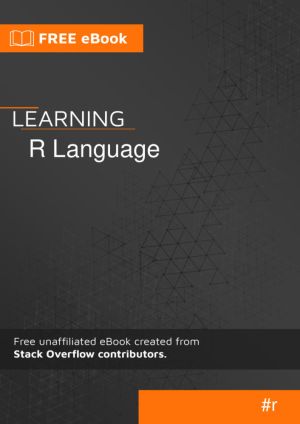Learning R
by Stack Overflow Community
DescriptionTable of ContentsDetailsHashtagsReport an issue 






Book Description
R is a programming language and free software environment for statistical computing and graphics. It is an unofficial and free R ebook created for educational purposes. All the content is extracted from Stack Overflow Documentation, which is written by many hardworking individuals at Stack Overflow.This open book is licensed under a Creative Commons License (CC BY-SA). You can download Learning R ebook for free in PDF format (10.2 MB).
Table of Contents
Chapter 1
Getting started with R Language
Chapter 2
*apply family of functions (functionals)
Chapter 3
.Rprofile
Chapter 4
Aggregating data frames
Chapter 5
Analyze tweets with R
Chapter 6
ANOVA
Chapter 7
Arima Models
Chapter 8
Arithmetic Operators
Chapter 9
Bar Chart
Chapter 10
Base Plotting
Chapter 11
Bibliography in RMD
Chapter 12
boxplot
Chapter 13
caret
Chapter 14
Classes
Chapter 15
Cleaning data
Chapter 16
Code profiling
Chapter 17
Coercion
Chapter 18
Color schemes for graphics
Chapter 19
Column wise operation
Chapter 20
Combinatorics
Chapter 21
Control flow structures
Chapter 22
Creating packages with devtools
Chapter 23
Creating reports with RMarkdown
Chapter 24
Creating vectors
Chapter 25
Data acquisition
Chapter 26
Data frames
Chapter 27
data.table
Chapter 28
Date and Time
Chapter 29
Date-time classes (POSIXct and POSIXlt)
Chapter 30
Debugging
Chapter 31
Distribution Functions
Chapter 32
dplyr
Chapter 33
Expression: parse + eval
Chapter 34
Extracting and Listing Files in Compressed Archives
Chapter 35
Factors
Chapter 36
Fault-tolerant/resilient code
Chapter 37
Feature Selection in R - Removing Extraneous Features
Chapter 38
Formula
Chapter 39
Fourier Series and Transformations
Chapter 40
Functional programming
Chapter 41
Generalized linear models
Chapter 42
Get user input
Chapter 43
ggplot2
Chapter 44
GPU-accelerated computing
Chapter 45
Hashmaps
Chapter 46
heatmap and heatmap.2
Chapter 47
Hierarchical clustering with hclust
Chapter 48
Hierarchical Linear Modeling
Chapter 49
I/O for database tables
Chapter 50
I/O for foreign tables (Excel, SAS, SPSS, Stata)
Chapter 51
I/O for geographic data (shapefiles, etc.)
Chapter 52
I/O for raster images
Chapter 53
I/O for R's binary format
Chapter 54
Implement State Machine Pattern using S4 Class
Chapter 55
Input and output
Chapter 56
Inspecting packages
Chapter 57
Installing packages
Chapter 58
Introduction to Geographical Maps
Chapter 59
Introspection
Chapter 60
JSON
Chapter 61
Linear Models (Regression)
Chapter 62
Lists
Chapter 63
lubridate
Chapter 64
Machine learning
Chapter 65
Matrices
Chapter 66
Meta: Documentation Guidelines
Chapter 67
Missing values
Chapter 68
Modifying strings by substitution
Chapter 69
Natural language processing
Chapter 70
Network analysis with the igraph package
Chapter 71
Non-standard evaluation and standard evaluation
Chapter 72
Numeric classes and storage modes
Chapter 73
Object-Oriented Programming in R
Chapter 74
Parallel processing
Chapter 75
Pattern Matching and Replacement
Chapter 76
Performing a Permutation Test
Chapter 77
Pipe operators (%>% and others)
Chapter 78
Pivot and unpivot with data.table
Chapter 79
Probability Distributions with R
Chapter 80
Publishing
Chapter 81
R code vectorization best practices
Chapter 82
R in LaTeX with knitr
Chapter 83
R Markdown Notebooks (from RStudio)
Chapter 84
R memento by examples
Chapter 85
Random Forest Algorithm
Chapter 86
Random Numbers Generator
Chapter 87
Randomization
Chapter 88
Raster and Image Analysis
Chapter 89
Rcpp
Chapter 90
Reading and writing strings
Chapter 91
Reading and writing tabular data in plain-text files (CSV, TSV, etc.)
Chapter 92
Recycling
Chapter 93
Regular Expression Syntax in R
Chapter 94
Regular Expressions (regex)
Chapter 95
Reproducible R
Chapter 96
Reshape using tidyr
Chapter 97
Reshaping data between long and wide forms
Chapter 98
RESTful R Services
Chapter 99
RMarkdown and knitr presentation
Chapter 100
RODBC
Chapter 101
roxygen2
Chapter 102
Run-length encoding
Chapter 103
Scope of variables
Chapter 104
Set operations
Chapter 105
Shiny
Chapter 106
Solving ODEs in R
Chapter 107
Spark API (SparkR)
Chapter 108
spatial analysis
Chapter 109
Speeding up tough-to-vectorize code
Chapter 110
Split function
Chapter 111
sqldf
Chapter 112
Standardize analyses by writing standalone R scripts
Chapter 113
String manipulation with stringi package
Chapter 114
strsplit function
Chapter 115
Subsetting
Chapter 116
Survival analysis
Chapter 117
Text mining
Chapter 118
The character class
Chapter 119
The Date class
Chapter 120
The logical class
Chapter 121
tidyverse
Chapter 122
Time Series and Forecasting
Chapter 123
Updating R and the package library
Chapter 124
Updating R version
Chapter 125
Using pipe assignment in your own package %<>%: How to ?
Chapter 126
Using texreg to export models in a paper-ready way
Chapter 127
Variables
Chapter 128
Web Crawling in R
Chapter 129
Web scraping and parsing
Chapter 130
Writing functions in R
Chapter 131
xgboost
Book Details
Title
Learning R
Subject
Computer Science
Publisher
RIP Tutorial
Published
2019
Pages
619
Edition
1
Language
English
PDF Size
10.2 MB
License

Related Books
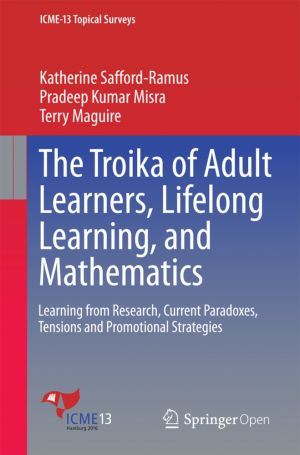
This book presents a synopsis of six emerging themes in adult mathematics/numeracy and a critical discussion of recent developments in terms of policies, provisions, and the emerging challenges, paradoxes and tensions. It also offers an extensive review of the literature adult mathematics education. Why do adults want to learn mathematics? Did they...
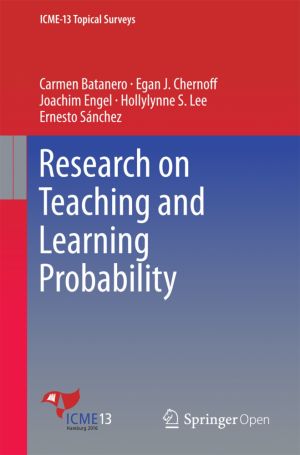
This book summarizes the vast amount of research related to teaching and learning probability that has been conducted for more than 50 years in a variety of disciplines. It begins with a synthesis of the most important probability interpretations throughout history: intuitive, classical, frequentist, subjective, logical propensity and axiomatic vie...

It argues that the main purpose of educational research is to improve student learning, and that international comparative studies are no exception....
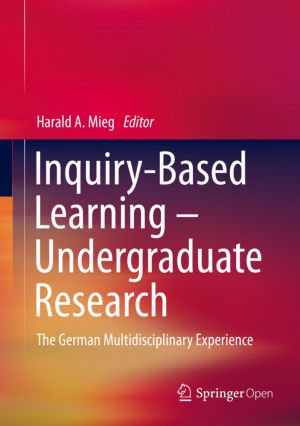
This book provides a systematic overview of experiences with Inquiry-Based Learning (IBL) and undergraduate research (UR) in German universities, covering both research universities (Universitäten) and universities of applied sciences (Fachhochschulen). Divided into three parts, the book starts with the principles and common practices of IBL/UR at...
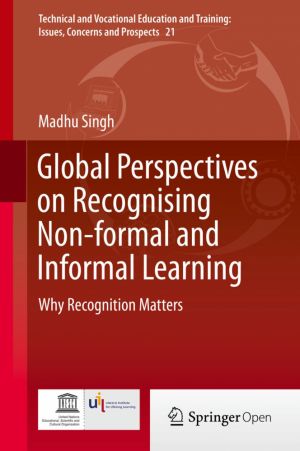
This book deals with the relevance of recognition and validation of non-formal and informal learning in education and training, the workplace and society. In an increasing number of countries, it is at the top of the policy and research agenda ranking among the possible ways to redress the glaring lack of relevant academic and vocational qualificat...
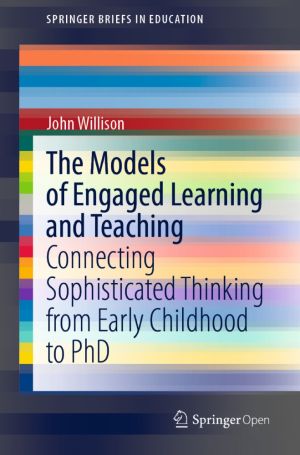
This book provides a practical philosophy for promoting students' sophisticated thinking from Early Childhood to PhD in ways that explicitly interconnect across the years of education. It will help teachers, academics and the broader learning and teaching community to understand and implement these connections by introducing a conceptual frame...

